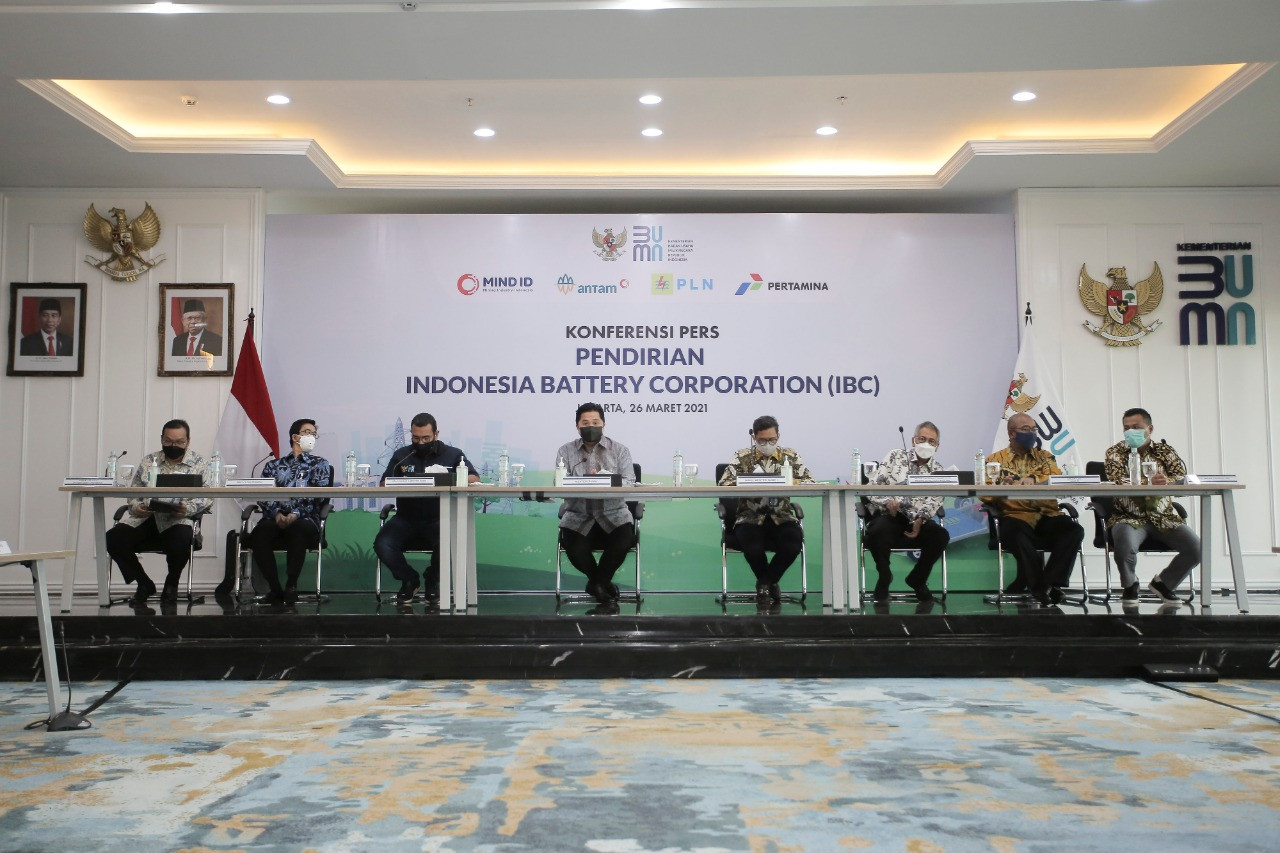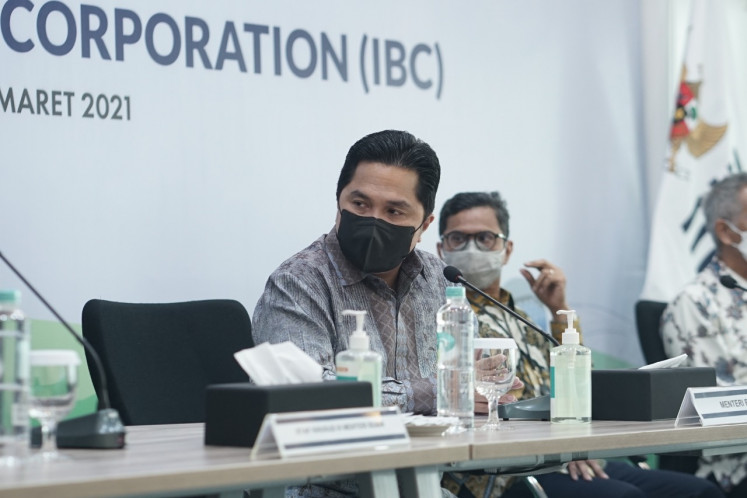Popular Reads
Top Results
Can't find what you're looking for?
View all search resultsPopular Reads
Top Results
Can't find what you're looking for?
View all search resultsIndonesia launches EV battery holding company
Indonesia Battery Corporation (IBC), with all its planned joint ventures, will be a US$17 billion investment, according to Deputy SOEs Minister Pahala N. Mansury.
Change text size
Gift Premium Articles
to Anyone
I
ndonesia Battery Corporation (IBC) is one step closer to becoming a reality after four large state-owned enterprises (SOEs) signed a shareholders’ agreement on the company’s ownership structure on March 16.
Under the agreement, state-owned oil giant Pertamina, electricity monopoly PLN, mining holding company MIND ID and nickel and gold miner PT Aneka Tambang (Antam) will each own 25 percent of IBC, an electric vehicle (EV) battery holding company.
IBC plans to partner with other companies, most notably China’s CATL and South Korea’s LG Chem, the world’s top two EV battery producers, to establish several joint ventures to create an end-to-end EV battery supply chain in Indonesia.
“The work is not yet done. This is still on paper. We hope to implement this by 2022 or 2023, in terms of producing [batteries] domestically. Inshallah [God willing], our good intention will create a legacy for Indonesia,” said SOEs Minister Erick Thohir during a joint press conference on Friday.
Read also: State holding to be Indonesia’s battering ram into global battery market
The government established IBC to penetrate the highly lucrative global EV market, which according to MIND ID’s estimates will nearly quadruple in size over the next six years to 777 gigawatt hours (GWh), largely driven by new EV demand but also by new energy storage system (ESS) demand.
Indonesia’s own battery demand is expected to grow 30 times over the same period to 5.9 GWh by 2027, assuming the government successfully pushes EV usage, particularly in the planned new state capital in Kalimantan, according to the same estimate.
Indonesia, the country with the world’s largest nickel reserves, enforced a landmark export ban on the commodity starting in January 2020 to force miners to invest in downstream industries. Nickel is a key ingredient in the production of contemporary EV batteries.
Read also: New tech jolts Indonesia’s battery dreams
“The aim is to create an integrated battery industry. We do not want just one battery factory but we want the mining sites, smelters, precursor product [plants], cathode [plants], battery pack [plants], battery storage [plants] and battery recycling [plants],” said Deputy SOEs Minister Pahala N. Mansury on Friday.
He said IBC aimed to produce 140 gigawatt hours (GWh) in battery energy annually starting in 2030. Some 50GWh of the production would be exported, and the remainder would be used in electric cars, electric motorcycles and ESS made in Indonesia.
Pahala said the total investment value behind IBC, with all its planned joint ventures, was US$17 billion.
Read also: Indonesia, LG clinch $9.8b deal to build world’s first integrated EV battery industry
SOEs Minister Erick Thohir (foreground) and SOEs Deputy Minister Pahala N. Mansury (background) officially launch the Indonesia Battery Corporation (IBC) from Jakarta on Friday, March 26, 2021. (SOEs Ministry/Aldi)The SOEs Ministry noted in a statement that starting 2030, Indonesia’s annual motor vehicle demand – regardless of engine type – was expected to reach 2 million for cars and 8.8 million for motorcycles, providing a big potential market for EVs.
Meanwhile, MIND ID’s president commissioner Agus Tjahajana Wirakusumah said IBC would own majority shares in the upstream joint ventures but minority shares of between 25 and 40 percent in downstream joint ventures as the two foreign companies had greater bargaining power over downstream capacities.
“Even though we are a minority shareholder in the downstream, the production will still be in Indonesia,” reiterated Agus, who is also chairman of the government’s EV battery acceleration task force.
Pertamina and PLN representatives added that the companies would build the infrastructure needed to support EVs in Indonesia.
“To ensure the availability of electricity, whether for the smelters or for the EVs, we will prepare power plants and power distribution systems,” said PLN president director Zulkifli Zaini.
Popularizing EVs would also enable PLN to sell more electricity. The power company is straining under the financial weight of power plant overcapacity on the islands of Java and Bali. The company is developing several business models exclusively for EV charging.
“This is part of our transition from fuel to electricity,” said Pertamina strategic portfolio and new ventures director Iman Rachman, adding that the oil company was testing adding electric charging stations to its gas stations.











